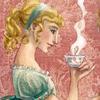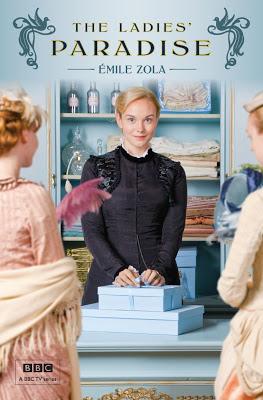 Because I'm grown-up and getting older? Because life is totally different? Please, let me get my glimpse of paradise! If romance is the form of escapism which makes me happy, let me smile in bliss or bite my nails (yes! I still do that when nervously watching/reading something which gets me excited or anxious), let me foolishly talk with the screen/page and encourage my heroes or menace their antagonists, let me giggle in joy or grunt in disappointment. It was some time I didn't get so enthusiastic for something. So, thanks a lot BBC1!
Because I'm grown-up and getting older? Because life is totally different? Please, let me get my glimpse of paradise! If romance is the form of escapism which makes me happy, let me smile in bliss or bite my nails (yes! I still do that when nervously watching/reading something which gets me excited or anxious), let me foolishly talk with the screen/page and encourage my heroes or menace their antagonists, let me giggle in joy or grunt in disappointment. It was some time I didn't get so enthusiastic for something. So, thanks a lot BBC1!
What am I blabbing about? The new series, THE PARADISE, just ended about an hour ago which was a lovely gift for my poor, bored heart. Its story and its characters won me over, my interest grew little by little, till exploding during episode 6 (if you saw it, YKWIM!) I know many of you haven't been able to see this series yet, so I'm not telling you much, I don't want to spoil your journey through this great story. But, since it has just finished, and I am still trying to calm down, could I at least say a little? No spoilers, I promise. Just this ...
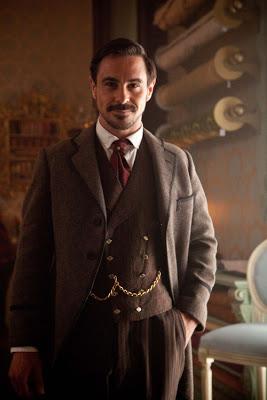
I will miss Mr Moray saying in his peculiar accent, " ... my little champion" or simply "Denise!". I will miss his rare smiles and his dangerous mixture of sweetness and self-confidence, his exotic look. My admiration for this character reminds me something. Do you remember another brooding handsome employer who caught my heart years ago? Never been replaced, actually. He is still my best favorite. Did I ever tell you about him? I know, Moray is not as tall as him, then he prefers neckties to the other's cravats. Young Moray is quite vain in his bizarre, fashionable, colourful clothes and works in a different field but, like the other one, he is a successful self - made man with his charms, who takes great care of his employees. And I appreciate this. By the way, they are both called John ! Any clue?
Mr Moray has a shadow in his past and a world of promises forward. Let's see what comes for him next. Lots of troubles, I guess, since The Paradise scriptwriters will have to design an entire second series and will have to find enough twists and turns to make it successful and not too foreseeable. I am definitely looking forward to it!
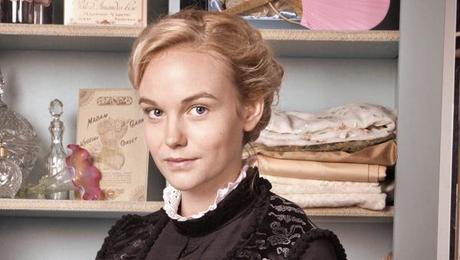
I will also miss Denise, the country girl with her blend of naivety and bluntness, cuteness and intelligence, endevour and strength. In episode 1, she had told she was not interested in marrying Mr Moray but in becoming like him, that is she wanted to become a successful woman . In episode 7 she said she wanted to leave her mark in the world as Mr Moray had done. And she did it, she made it! She left her mark in our hearts. In mine, at least. I love her charachter, she is a model 19th century literary heroine to me.
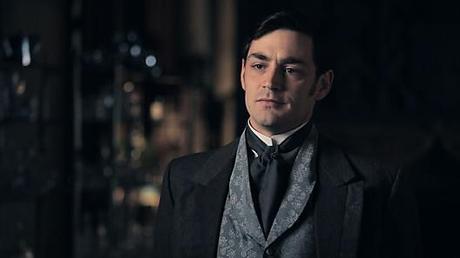
I will miss also all the other characters: Mr Dudley (handsome man!) whom I hope will show us more of himself as in series 2, being not only as Moray's best friend and wing man; Edmund Lovett, Denise's uncle, and Miss Audrey who have taught us that it is never too late; Mr Jonas and his disquieting Dickensian look; Pauline, Clara and Sam with little Arthur and all their stories.
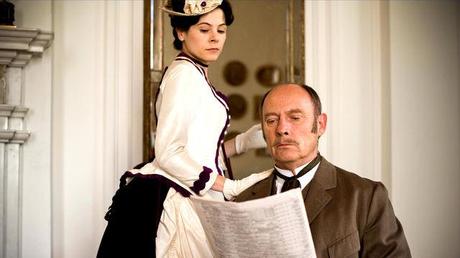
I can't say I'll miss the Glendennings, father and daughter, but , honestly , what will a good story be without a poisonous antagonist for the heroine? So, what terrible events will Katherine Glendenning's hate for Denise bring to the new episodes? I'm rather scared, after seeing the devilish look in her eyes in this last episode!
We will miss The Paradise and its glamour, its colours, its departments full of life and chattering, its colourful windows and its special offers, won't we? Do you like me wonder if the man who made The Paradise successful will win his battle to keep it for himself? Or if he will call his "little champion" by any other name? I won't ask for more. I won't say more. Except for ... well done, everyone in the cast: Emun Elliottas John Moray, Joanna Vanderhamas Denise Lovett, Elaine Cassidyas Katherine Glendenning, Sarah Lancashireas Miss Audrey, Matthew McNultyas Dudley, Peter Wightas Edmund Lovett, Denise' uncle, David Haymanas Jonas, Stephen Wightas Sam, Sonya Cassidy as Clara, Ruby Bentallas Pauline, Finn Burridge as Arthur, Patrick Malahideas Lord Glendenning.
And thanks again and a lot, BBC1, for letting us go on dreaming and believing in fairy-tales. From time to time, at least.
Perfect Christmas gift for costume drama fans? The Paradise DVD! For classic litereture readers? The Ladies Paradise by Emile Zola. Think about it!
Read a passage from the original novel by Emile Zola, on which the series was based. Denise has just arrived in Paris (London in BBC series) and is going for her job interview at the Paradise:
Denise had not dared before to venture into the silk hall; its high glazed ceiling, sumptuous counters, and church-like atmosphere frightened her. Then, when she had at last gone in, to escape the grinning salesmen in the linen department, she had stumbled straight into Mouret’s display; and though she was scared, the woman in her was aroused, her cheeks suddenly flushed, and she forgot herself as she gazed at the blazing conflagration of silks.
‘Hey!’ said Hutin crudely in Favier’s ear, ‘It’s the tart we saw in the Place Guillon.’
Mouret, while pretending to listen to Bourdoncle and Robineau, was secretly flattered by this poor girl’s sudden fascination with his display, as a duchess might be by a brutal look of desire from a passing drayman. But Denise had raised her eyes, and she was even more confused when she recognized the young man she took to be the head of a department. She thought he was looking at her sternly. Then, not knowing how to get away, quite distraught, she once again approached the nearest assistant, who happened to be Favier. ‘Could you tell me where I can find Madame Aurélie, please?’ Favier gave her an unpleasant look and replied curtly: ‘On the mezzanine floor.’ Denise, anxious to escape from all these men who were staring at her, thanked him and was once more walking away from the staircase she should have climbed, when Hutin yielded to his natural instinct for gallantry. He had called her a tart, but it was with his most amiable salesman’s smile that he stopped her. ‘No, this way, miss … If you would be so good as to…’ He even went with her a little way to the foot of the staircase in the left-hand corner of the hall. There he bowed slightly, and smiled at her with the smile he gave to all women. ‘Upstairs, turn left … The ladieswear department is straight ahead.’ […] ‘You’re too kind … Please don’t trouble … Thank you so much, sir …’ Hutin had already rejoined Favier, to whom he said under his breath, in a crude tone: ‘She’s skinny, eh!’ Upstairs the girl found the ladieswear department straight away. It was a vast room with high cupboards of carved oak all round, and plate-glass windows facing the Rue de la Michodière. Five or six women in silk dresses, looking very smart with their chignons curled and their crinolines sweeping behind them, were moving about, talking to each other. One of them, tall and thin, with an elongated head which made her look like a runaway horse, was leaning against a cupboard, as if she was already tired out. ‘Madame Aurélie?’ Denise repeated. The saleswoman looked at her without replying, with an air of disdain for her shabby dress; then, turning to one of her companions, a short girl with a pasty complexion, she asked in an artless, wearied manner: ‘Mademoiselle Vadon, do you know where Madame Aurélie is?’ The girl, who was in the process of arranging long cloaks in order of size, did not even take the trouble to look up. ‘No, Mademoiselle Prunaire, I don’t know,’ she said rather primly. A silence ensued. Denise stood there, and no one took any further notice of her. However, after waiting a moment she plucked up enough courage to ask another question. ‘Do you think Madame Aurélie will be back soon?’ Then the assistant buyer of the department, a thin, ugly woman whom she had not noticed, a widow with a prominent chin and coarse hair, called to her from a cupboard where she was checking price tickets: ‘You’ll have to wait if you want to talk to Madame Aurélie personally.’ And, addressing another saleswoman, she added: ‘Isn’t she in the reception office?’ ‘No, Madame Frédéric, I don’t think so,’ the girl replied. ‘She didn’t say anything; she can’t be far away.’ Denise remained standing. There were a few chairs for customers, but as no one told her to sit down she did not dare to take one, although she felt that her legs might drop off with fatigue. These young ladies had clearly sensed that she was a salesgirl coming to apply for a job, and they were staring at her, stripping her naked, out of the corners of their eyes, with the veiled, ill-natured hostility of people seated at table who do not like moving up to make room for those outside who are hungry. Her embarrassment grew; she crossed the room very quietly and looked out into the street, just for something to do. Just opposite, the Vieil Elbeuf with its rusty frontage and lifeless windows seemed to her so ugly, so wretched, seen thus from the luxury and life of her present vantage-point, that her heart was wrung with something akin to remorse. ‘I say,’ whispered tall Mademoiselle Prunaire to little Mademoiselle Vadon, ‘did you see her boots?’ ‘And her dress!’ murmured the other.
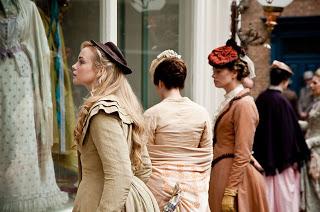 Denise had not dared before to venture into the silk hall; its high glazed ceiling, sumptuous counters, and church-like atmosphere frightened her. Then, when she had at last gone in, to escape the grinning salesmen in the linen department, she had stumbled straight into Mouret’s display; and though she was scared, the woman in her was aroused, her cheeks suddenly flushed, and she forgot herself as she gazed at the blazing conflagration of silks.
Denise had not dared before to venture into the silk hall; its high glazed ceiling, sumptuous counters, and church-like atmosphere frightened her. Then, when she had at last gone in, to escape the grinning salesmen in the linen department, she had stumbled straight into Mouret’s display; and though she was scared, the woman in her was aroused, her cheeks suddenly flushed, and she forgot herself as she gazed at the blazing conflagration of silks.
